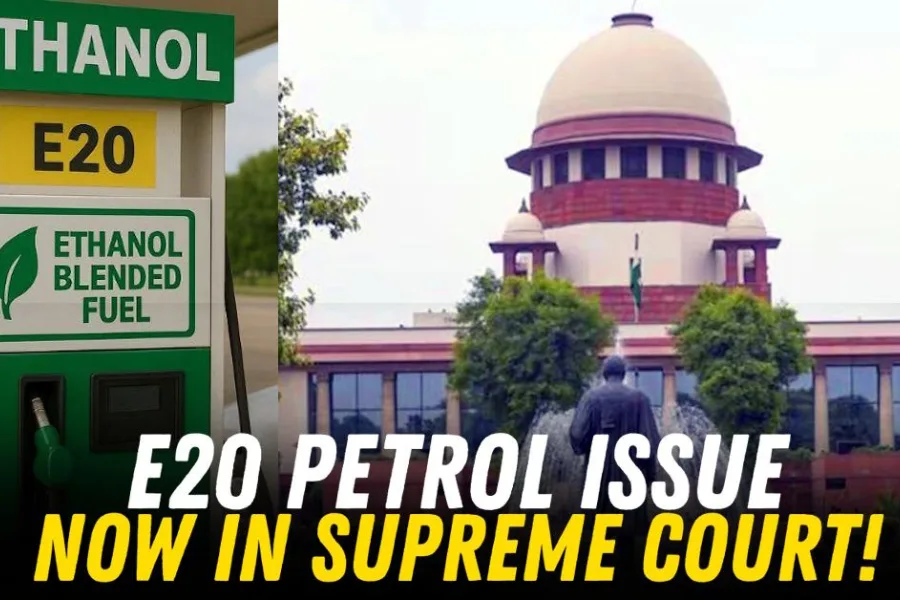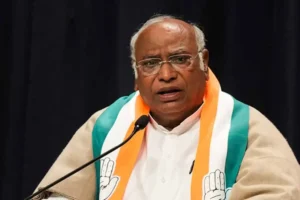
Supreme Court on E20 Petrol Policy: The Supreme Court of India has rejected a Public Interest Litigation (PIL) contesting the government’s bold E20 petrol initiative. It requires a 20% ethanol blend with petrol nationwide by 2025/26. The petition requested a substitution of petrol without ethanol for cars built before April 2023. So the supreme court deemed the request unworthy.
The Position of the Supreme Court
A bench led by Chief Justice BR Gavai and Justice K Vinod Chandran dismissed it. This was after hearing arduous arguments from the Attorney General R Venkataramani. He argued that the demand for ethanol-free petrol was only from vested interests. India must not submit to external pressures determining its fuel policies.
Senior lawyer Shadan Farasat, who is representing the petitioner, referenced a 2021 NITI Aayog report that pointed out a six percent decrease in fuel efficiency for older vehicles utilizing blended fuel. He argued that E20 is an advancement. Yet car owners should have the option of purchasing E10 petrol.
However, the court took a pro-government position. This further strengthened the argument calling for the transition into a higher ethanol mixture for the ecological and economic objectives of the nation.
The Indian government has been taking every opportunity to convince that E20 petrol holds several benefits. Earlier this month, officials stated the policy would achieve:
- A substantial reduction in vehicle emissions.
- Saving billions in costly crude oil purchases.
- Improved ride comfort and speed in certain vehicles.
The Ministry of Petroleum and Natural Gas relied on NITI Aayog’s report, which showed that greenhouse gas emissions relating to ethanol were substantially less than to petroleums – 65% lower for ethanol made from sugarcane, and 50% lower for ethanol made from maize.
Union Road Transport and Highways Minister Nitin Gadkari observed that the benefits of the policy are not only that the ethanol blending has reduced vehicle emissions and footprint, it has contributed to a reduction in the carbon footprints of UK railways too!
Economic and Agricultural Impacts
In addition to the environmental benefits, the E20 program is touted as an economic driver for the rural economy in India. The demand for ethanol has created a market for emissions for maize and sugar cane farmers, in turn improving their income levels.
Policy officials have made claims that the program is linked to declines in farmer distress, indicating that some of the income for ethanol is the demand for maize and sugar cane and that the increased and stable income has led to in rates of farmer suicide in parts of rural India.
Attorney General Venkataramani also advised the court that the program aims to ensure India’s energy independence. “Are foreigners going to determine what fuel India should use?” he asked, rejecting the opposition as having an industry interest.
Concern from Car Owners and Enthusiasts
Despite strong government support, car owners and auto enthusiasts remain divided. Many are concerned about how E20 petrol may affect engine performance, fuel economy, and long-term vehicle dependability, especially for vehicles made prior to April 2023 that were not designed for high ethanol blends.
The petitioner in this case said that E20 is a reasonable advancement, but that not having E10 petrol is a major concern. Nevertheless, the court and government are adamant about a national transition, leaving owners of older vehicles with limited choice.
Ethanol blending: the numbers
In recent years, India has made considerable progress in ethanol blending.
- 2022/23 – the average blending was 12.06%.
- 2023/24 – the blending rose to 14.6%.
- February 2025 – blending reached 19.6%.
- 2025 – the government achieved its 20% target even sooner than expected.
This headline encapsulates the seriousness of the government’s engagement with it, and its serious commitment to move away from fossil fuels.
This decision by the Supreme Court represents another significant inflection point in India’s transition towards sustainable energy. Although there are legitimate concerns for vehicle owners, it seems like India’s proposition for environmental, oil importation, and farmer support (food sovereignty) is being expedited.
Recent news updates suggest India is moving forward with the commitment to E20 fuel, which indicates a push to engage with alternative globally acceptable energy solutions.
This decision is in relation to vehicle owners and reaffirming the commitment of the government towards supporting environmentally sound practices, farmer sustainability and, energy security.





